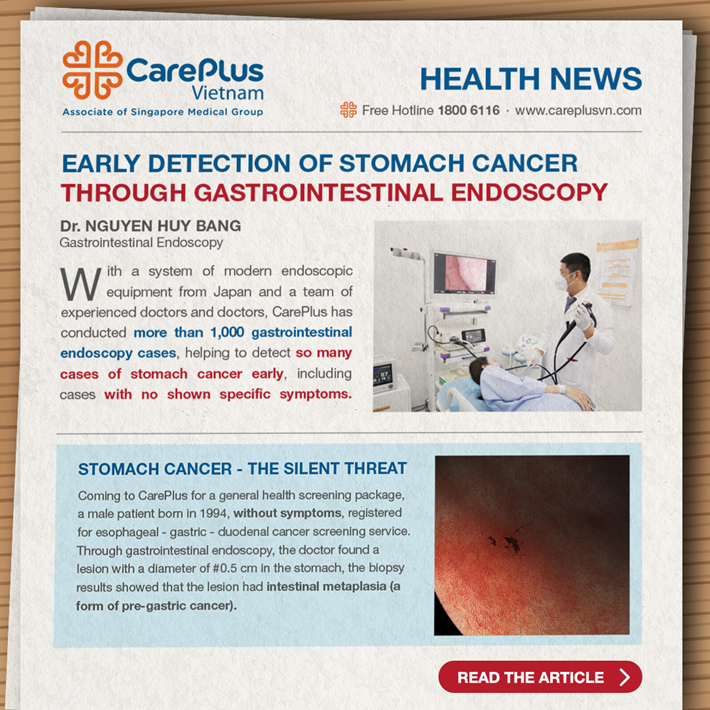EARLY DETECTION OF STOMACH CANCER IN 1,000 CASES THROUGH GASTROINTESTINAL ENDOSCOPY
CarePlus has detected early-stage stomach cancer in numerous cases among the 1,000 customers who have undergone gastrointestinal endoscopy. THEREFORE, SCREEN FOR STOMACH CANCER THROUGH GASTROINTESTINAL ENDOSCOPY.

9/3/2024 9:29:33 PM
CarePlus has detected early-stage stomach cancer in numerous cases among the 1,000 customers who have undergone gastrointestinal endoscopy. THEREFORE, SCREEN FOR STOMACH CANCER THROUGH GASTROINTESTINAL ENDOSCOPY.
Recently, during a company health check-up, male customer Đ.Đ.K, born in 1994, registered for an additional screening package for esophageal, stomach, and duodenal cancer at CarePlus Clinic. Through endoscopy, the doctor discovered a lesion in the stomach measuring 0.5 cm in diameter. A subsequent biopsy revealed that the lesion was in a state of intestinal metaplasia (a precancerous condition of the stomach).
Thanks to early detection, Mr. K. received timely treatment from the doctor, reducing the risk of the condition progressing into cancer.
It’s important to note that Mr. K.'s case is not an isolated one. Over the past few years, with state-of-the-art endoscopic equipment from Japan and a team of highly experienced doctors, CarePlus has detected early-stage cancer in many of the 1,000 gastrointestinal endoscopies performed.
Thanks to early screening and timely medical intervention, the doctors at CarePlus have helped patients prevent risk factors from progressing into cancer, thereby improving their quality of life.
STOMACH CANCER - A SILENT THREAT
Stomach cancer is one of the most common types of cancer in Vietnam and around the world, with increasingly complex developments and a tendency to affect younger people. In its early stages, stomach cancer often presents no clear symptoms, or it manifests with symptoms easily mistaken for other digestive disorders.
Some patients are fortunate enough to detect stomach cancer early during routine health check-ups or by chance when examining other symptoms. However, the majority of patients only discover the disease at an advanced stage, which leads to less effective treatment and more complications and side effects from both the cancer and its treatment.
According to Japanese experts, if stomach cancer is detected early and treated promptly, the chances of a cure are high, with a 5-year survival rate of up to 90%. Therefore, screening for stomach cancer is the most critical factor in improving a patient's survival outlook.
ADVANTAGES OF ENDOSCOPY IN GASTROINTESTINAL CANCER SCREENING
Esophagogastroduodenoscopy (EGD) is currently the most widely used method for screening stomach cancer.
Through endoscopy, doctors can identify abnormal lesions in the esophagus, stomach, and duodenum, and assess the location, size, and surface characteristics of these lesions, allowing for an on-site diagnosis or invasive procedures such as biopsy and lesion removal.
In addition, precancerous lesions, such as atrophy, ulcers, polyps, or hyperplastic lesions, can also be detected through endoscopy. Biopsies of suspicious lesions can further identify precancerous conditions on histopathology, such as atrophy, hyperplasia, metaplasia, dysplasia, etc. Additionally, endoscopy can evaluate the presence or absence of Helicobacter pylori infection, a major risk factor for stomach cancer.
Stomach cancer is a complex disease, but it can be completely cured if detected early. Take proactive steps to screen your health regularly and screen for stomach cancer to receive timely medical consultation, examination, and treatment